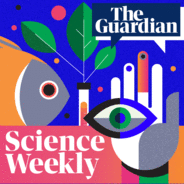They may be one of the world’s favourite supplements but, according to a study from earlier this year, more than one in 10 fish oil capsules are rancid. Most of the oil comes from Peruvian anchovetas, a type of anchovy that is also used to feed pigs, poultry and farmed fish. And despite catching more than 4m tonnes a year of anchovetas to cater to the global demand, large industry players want to scale this up even further. In this episode from January 2022, Madeleine Finlay speaks to environment journalist Richa Syal about why so many fish oil pills are rancid, and hears from journalist Dan Collyns in Chimbote, Peru, about how the industry is affecting the local environment and its residents. Help support our independent journalism at theguardian.com/sciencepod

Wissenschaft & Technik
Science Weekly Folgen
Twice a week, the Guardian brings you the latest science and environment news
Folgen von Science Weekly
300 Folgen
-
Folge vom 16.08.2022From the archive: What are the hidden costs of our obsession with fish oil pills?
-
Folge vom 11.08.2022From the archive: Are western lifestyles causing a rise in autoimmune diseases?Could the food we eat and the air we breathe be damaging our immune systems? The number of people with autoimmune diseases, from rheumatoid arthritis to type 1 diabetes, began to increase around 40 years ago in the west. Now, some are also emerging in countries that had never seen the diseases before. In this episode from January 2022, Ian Sample speaks to the genetic scientist and consultant gastroenterologist James Lee about how this points to what western lifestyles might be doing to our health, and how genetics could reveal exactly how our immune systems are malfunctioning. Help support our independent journalism at theguardian.com/sciencepod
-
Folge vom 09.08.2022From the archive: Why are climate and conservation scientists taking to the streets?In early April this year, the Intergovernmental Panel on Climate Change released a new report giving the world just 30 months to get greenhouse gas emissions falling. Beyond that, we’ll have missed our chance of limiting global heating to 1.5C. As this summer of heatwaves, droughts, wildfires and floods prove, going much above 1.5C will have truly devastating consequences for us and the planet. With the window of opportunity rapidly closing, some scientists feel like writing reports and publishing papers is no longer enough, and are leaving their desks and labs to take action on the streets. In this episode recorded back in April, Madeleine Finlay meets scientists protesting at Shell HQ in London and speaks to the conservationist Dr Charlie Gardner about civil disobedience – and why he thinks it’s the only option left. Help support our independent journalism at theguardian.com/sciencepod
-
Folge vom 04.08.2022James Lovelock and the legacy of his Gaia hypothesisJames Lovelock, the creator of the Gaia hypothesis, died last Tuesday on his 103rd birthday. Known as something of a maverick, the scientist and inventor was one of the most influential thinkers of the past century. Our global environment editor, Jonathan Watts, tells Madeleine Finlay about spending time with Lovelock for his forthcoming biography, the impact of the scientist’s ideas and inventions on the modern world, and how his immense influence will continue to be felt in the critical decades ahead. Help support our independent journalism at theguardian.com/sciencepod
